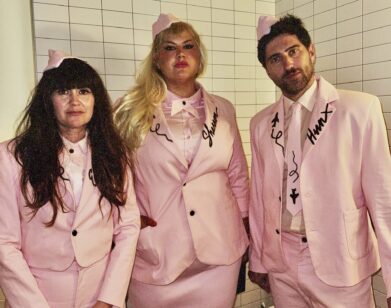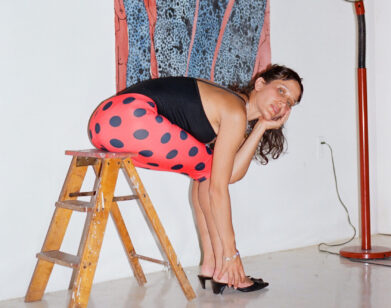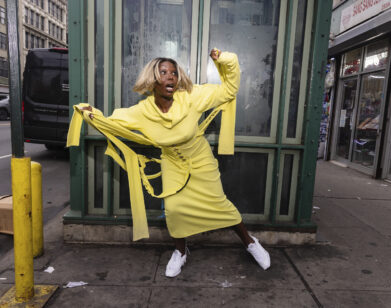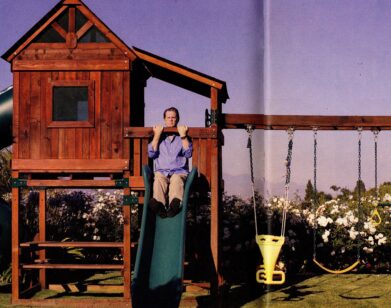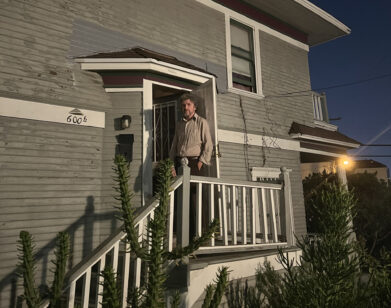MAGGIE ROGERS IS FINALLY ABLE TO STARE DIRECTLY INTO HER BRIGHT FUTURE
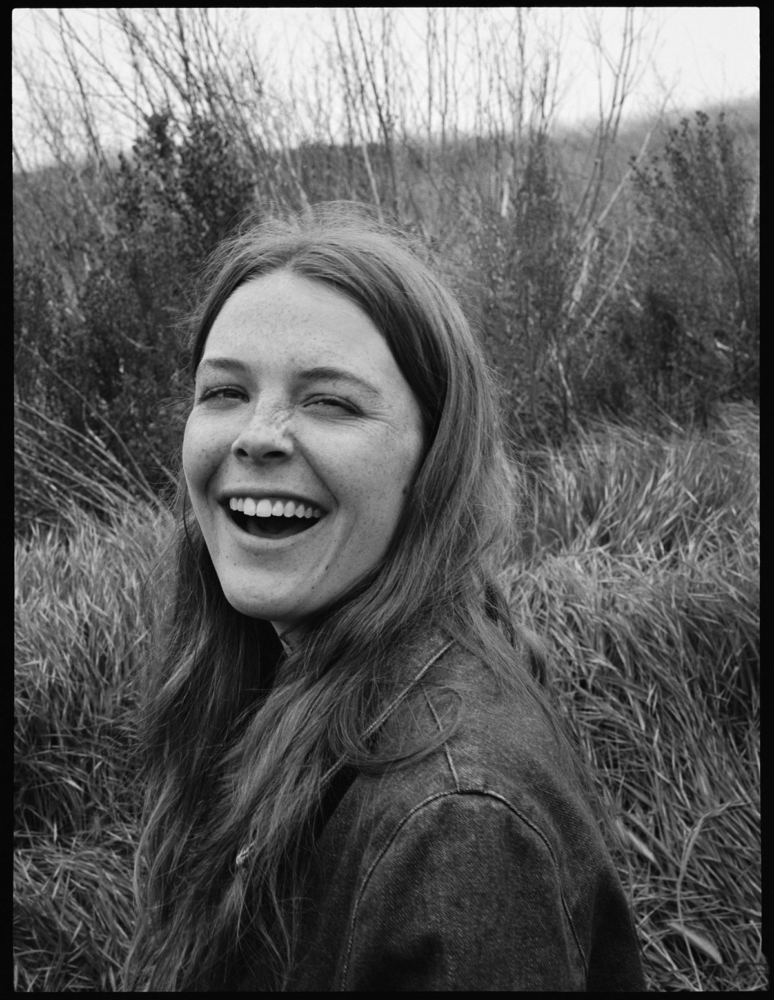
Photo: Olivia Bee.
Maggie Rogers and Rostam Batmanglij go way back, back to “Delmarva” technically. That’s the Delaware, Maryland, Virginia tri-state area where Rogers and Batmanglij both grew up, before their respective moves to New York City to pursue careers in music. While the story of Batmanglij is very much in the public domain for a certain kind of pop-music obsessive — he’s a multi-instrumentalist, producer, singer, and songwriter, formerly of Vampire Weekend — Rogers is in the throes of her come-up. After her now-viral, record-deal sealing performance for Pharrell as a student at NYU, Rogers released her long-awaited debut album, Heard It In A Past Life, this past week. Produced by Batmanglij, along with Greg Kurstin and several other industry heavyweights, it’s a falsetto-rich collection of songs that just might bring the folky, Alaska-trekking singer-songwriter into pop stardom. After two years of preparation, and well after Roger’s viral success, it’s a re-introduction of sorts; this November, Rogers and Batmanglij performed the piano-laced electro-pop anthem “Fallingwater” on Saturday Night Live, although neither remembers the specifics of it. Performing, Batmanglij told Rogers, as they sat on the couch in her Los Angeles home for this conversation, is a bit like a psychedelic drug. It’s a far cry from the buzz of caffeinated tea served by Batmanglij’s mother to Rogers back in their Delmarva days. As the pair conclude while discussing the necessity of ruling your inbox, letting go of your music, and New York’s fading cool, it’s a far cry, indeed.
———
ROSTAM BATMANGLIJ: One thing people might not know about us is that we’re both from the Delmarva Tri-State area.
MAGGIE ROGERS: I actually had to explain to people what Delmarva was yesterday. Somebody at YouTube found a video of me as a 17-year-old playing on a daytime talk show called Delmarva Life. I was cringing so hard.
ROSTAM: It’s extra funny if you don’t know what Delmarva is.
ROGERS: Yeah, nobody knows what Delmarva is.
ROSTAM: It’s kind of like some kind of gecko, or —
ROGERS: A salamander. [Laughs.]
ROSTAM: But we both went to college in New York. Did you specifically want to go to college there?
ROGERS: No.
ROSTAM: Because it was kind of like that for me, it kind of drew me.
ROGERS: I know that because I’ve transcribed your interview. I was an editorial assistant and transcribed a very very large chunk of Lizzy Goodman’s book Meet Me In The Bathroom, which is an oral history of the music scene in New York in the 2000s. It was really interesting because a lot of the people in those interviews had these grand dreams of New York as they were growing up. And I never had that. Maybe because I got to go to New York a couple times when I was younger, it wasn’t this like far off, out of touch thing. I didn’t decide on what college I was going to go to until the day I had to. And the other ones were in, like, rural Massachusetts. Either I was going to the woods to study English, or I was really really going to commit to a career in music. And I knew that no matter where, if I really wanted to commit to a career in music, I needed to be in this program and I needed to be in New York.
ROSTAM: As a kid I had gone to New York a handful of times with my family. I definitely think it planted a seed in me. I had this teacher who told me, “If you want to make music, New York isn’t a place, New York is the place.”
ROGERS: I heard the same thing. I did a Berklee five-week summer program, and everyone I talked to in Boston was like, don’t come here. Go to New York.
ROSTAM: Yeah, so that was in the early 2000’s, now we flash forward —
ROGERS: Now it’s LA.
ROSTAM: Everybody lives in LA.
ROGERS: New York is so strange. Every time I’m there, I very rarely see someone who’s dressed cool.
ROSTAM: Uh-oh. [Laughs.]
ROGERS: Maybe it’s controversial, but when I visit the old neighborhoods that I used to find a lot of creative inspiration in, I’m not finding it in the same way.
ROSTAM: I think what you’re saying is that the Lower East Side used to be this place where stuff was happening. Did you ever go to that club Tonic? They would hire a New York-based musician to curate an entire month of shit. It was right on Norfolk Street, just north of Delancey. I think it closed in 2006. [Editor’s note: Tonic closed in 2007.]
ROGERS: Dude, I was in 6th grade.
ROSTAM: Wow, I’m really showing my age.
ROGERS: I was born in 1994.
ROSTAM: So we are a decade apart. And we’re from the mid-Atlantic, both went to New York, and would you say that you also kind of live in LA now?
ROGERS: In a way. I’ve lived with my parents for the last year and a half. I love them dearly, but I think I need a little bit of space. I’m in this weird place right now that I feel like I’m coming up for air from the last two and a half years and being like, okay, what happened? And I’m reevaluating: what parts of this fulfill me, which parts don’t? One of the biggest things I miss is being a good friend. My friends have all given me a pass and supported me so so powerfully over the last couple of years because they knew I was just treading water. But I realize that being a solid contributing member to these communities is really important to me. For the first time now, I feel like my email isn’t running my life. And I’m remembering how to make things on a daily basis.
ROSTAM: Email is something I’ve changed my relationship to. I remember being in college and there was this one kid who didn’t respond to emails. I said to him, “Hey man, sometimes you don’t respond to email.” And he’s like, “Yeah, I just don’t.” [Laughs.] And at that time, I couldn’t imagine not responding to an email. I’m trying to get to a point where I tell people, if you want to get in touch with me, please don’t rely on email. I don’t want to be a slave to it. They say you should check your email at lunch and dinner and respond to all the emails as soon as you get them.
ROGERS: You and I have had a lot of conversations about this. You have been the consistent figure in my life being like, “Everything’s going to be fine.”
ROSTAM: Once the album’s out, nothing will change, but you will experience this transition. It’s like a new era of your life. It’s easier for me to remember things based on the releases of albums. The year is such an arbitrary thing.
ROGERS: For me, it’s important to ask, what are you making and what’s the public’s relationship to that. And I say public relationship because I don’t really care so much about any sort of reception. What I care about is emotionally and narratively getting to be on the same page as my audience for the first time.
ROSTAM: It’s funny that you mention the public. Two things: Everybody gets to hear it. Literally, anyone who wants to hear any song can at the drop of the hat. It didn’t always used to be like that. And then also, once it’s up, you can never change it.
ROGERS: You make something and you give it away. It can no longer be mine anymore.
ROSTAM: It’s like shedding a skin in a beautiful way.
ROGERS: You’re going to laugh at this, but I feel like I’m finally becoming my album cover. Something really intense happened to me during the SNL performance. It felt like the person I was made to be faced the person I’m becoming. It was the first time I felt like I was able to make any sense of ownership of my work. I’ve spent so long downplaying it or being uncomfortable with it. It was like I was able to stare directly at the sun for the first time.
ROSTAM: The amount of adrenaline that you produce when doing something like a live performance on TV — it’s almost like a psychedelic drug.
ROGERS: Can it chemically alter you?
ROSTAM: Maybe.
ROGERS: Have you watched it?
ROSTAM: I still haven’t watched it.
ROGERS: I haven’t watched it either. I’m glad we’re both holding true to our pact. I have very little memory of the actual performance. And the only other time that happened to me was when the Pharrell video was being recorded. The sense of being so present that memory is not being created. I remember walking to the stage and I remember starting and I remember finishing. But I don’t remember the minutiae.
ROSTAM: It’s kind of funny to think that it’s been permanently archived.
ROGERS: Yeah. That’s a weird side effect.
ROSTAM: Kind of like this interview.

